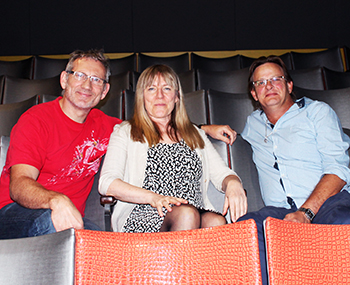Latest News Archive
Please select Category, Year, and then Month to display items
12 January 2024
|
Story Nonsindiswe Qwabe
|
Photo Sonia Small
 Since joining the UFS in 2008, Dr Grey Magaiza has worked extensively on approaches that can foster the socio-economic transformation of societies.
Since joining the UFS in 2008, Dr Grey Magaiza has worked extensively on approaches that can foster the socio-economic transformation of societies.
“The future should be one where communities can decide on their development agenda and futures. That’s the most important for me.” Dr Grey Magaiza, Deputy Director of the Centre for Gender and Africa Studies (CGAS) and Head of the Community Development programme on the Qwaqwa Campus, is passionate about capacitating communities to be agents of change and advancement. His vision for the future emphasises the empowerment of communities to take charge of their development by actively participating in decision making and the implementation of development projects that can improve their lives.
Since joining the UFS in 2008, Dr Magaiza has worked extensively on approaches that can foster the socio-economic transformation of societies. Over the years, he has crafted his research speciality into one that he is most proud of – being an interdisciplinary scientist immersed in the development of communities.
“I’m in a fortunate position of researching what I like. I say ‘fortunate’, because I’ve taken the time to understand what I’m passionate about, which is the overall field of rural livelihoods and livelihood futures – in short, community development. My research starts from an engaged university, understanding the elements that a university must use to enhance transformation and relevance to its immediate community in terms of development.”
One of the ways he has done this is by looking at social entrepreneurship as a development approach for young people in a rural setting. Through workshops with non-profit and civic organisations in Qwaqwa, Dr Magaiza has been helping these organisations to map out their needs and actively meet them through the involvement and support of external role players.
“We understand that communities are part of the national development agenda, but even that national agenda respects community knowledge and intentions and allows communities to shape their identity. A critical enabler of this is community organising. You bring back the capacity in communities to have dialogues on issues affecting them as spaces for engagement, knowledge exchange, and for people to just talk about their way forward.”
By enabling communities to define their development agenda, they can address their specific needs, challenges, and aspirations, he said. “When I look at livelihood futures, it’s quite an exciting aspect of my work – it’s like looking into a fortune tellers’ globe, because you’re not deciding for communities what they should do, but the communities themselves take those decisions.”
Prof Van den Oever gives students a different perspective
2016-05-06

Prof Annie van den Oever from the Netherlands presented a series of guest lectures on media technologies to students of the Film and Visual Media Programme at the University of the Free State (UFS). Here from left is Chris Vorster, lecturer in Drama and Theatre Arts, Prof Van den Oever, and Dr Pieter Venter, Senior lecturer at Drama and Theatre Arts.
Photo: Jóhann Thormählen |
She played a part in conceptualising the Film and Visual Media Programme at the University of the Free State (UFS), and sees film from a perspective different from most young South Africans.
According to Chris Vorster, lecturer of the UFS BA Honours degree in Film and Visual Media, this is one of the reasons why Prof Annie van den Oever’s visit is of such great value. The actor, who is a lecturer in Drama and Theatre Arts, believes it is important to expose his students to influences outside their normal experience.
Prof Van den Oever, an extraordinary professor at the UFS since 2011, presented a series of guest lectures on media technologies from 11-14 April 2016 at the Audio Visual Studio on the Bloemfontein Campus. She is a senior researcher for Film at the University of Groningen in the Netherlands, and an Associated Researcher for Film at Paris 1, Panthéon Sorbonne, in France.
Another milieu
“It is invaluable for students, in any field of study, to receive as many influences from the outside. Therefore, it is important to have someone here from another milieu and context. And academically, she is outstanding,” says Vorster.
Vorster’s students are also exposed to practical expertise from the industry in the country, not only academics.
Relationship with UFS
Prof Van den Oever says she usually visits the UFS twice a year. Her recent lecture series on media technologies was about the power of visual and film culture today, and how you can understand its powers. “Why strange effects work strongly and why the strange is inserted, because people respond strongly to them,” she says.
Prof van den Oever enjoys meeting new people, and often works with colleagues from the UFS on various projects. She also is full of praise for the management of the university. “It is great to work across cultures, and be part of a university in transition.”